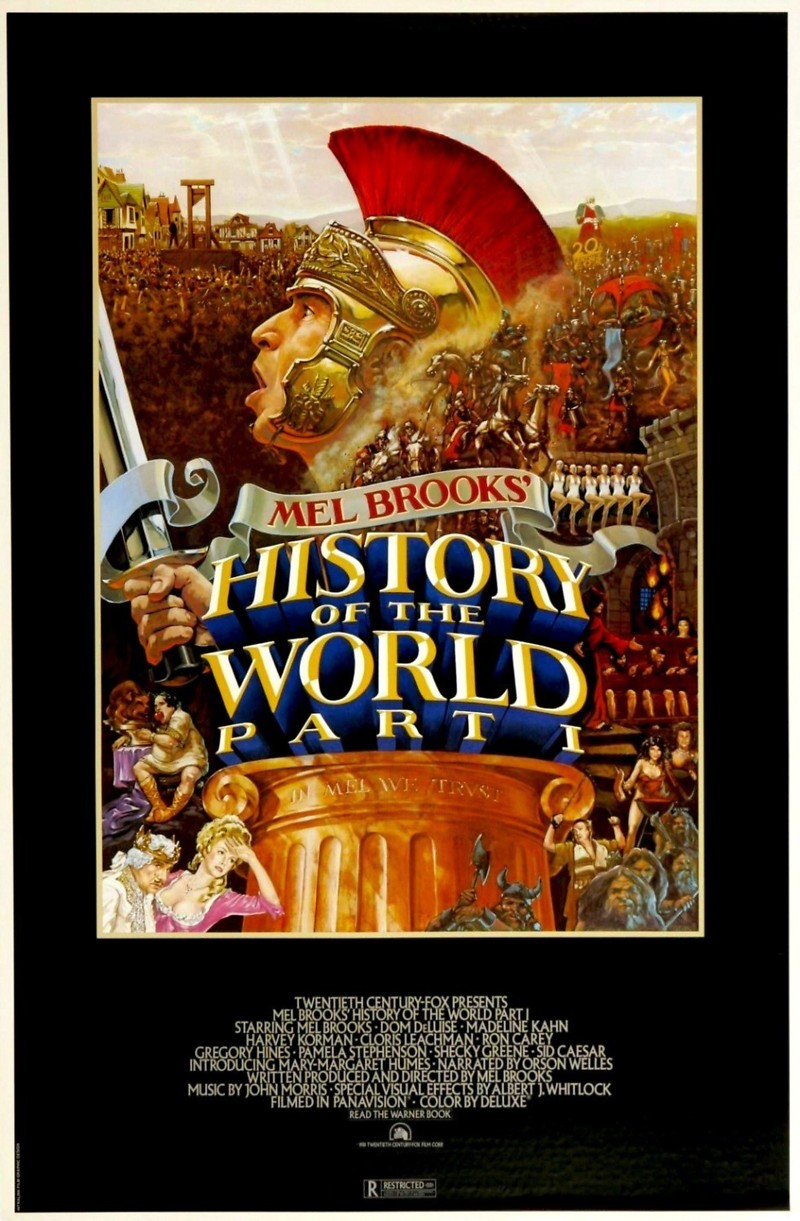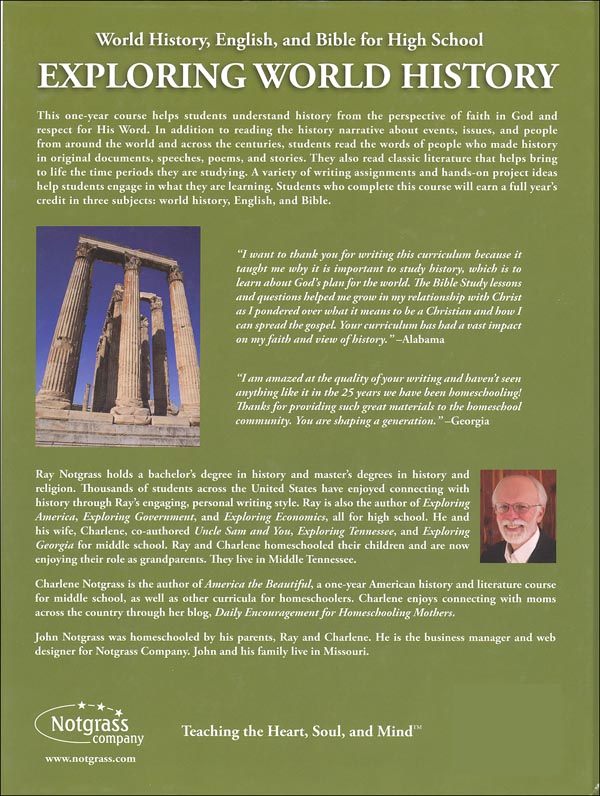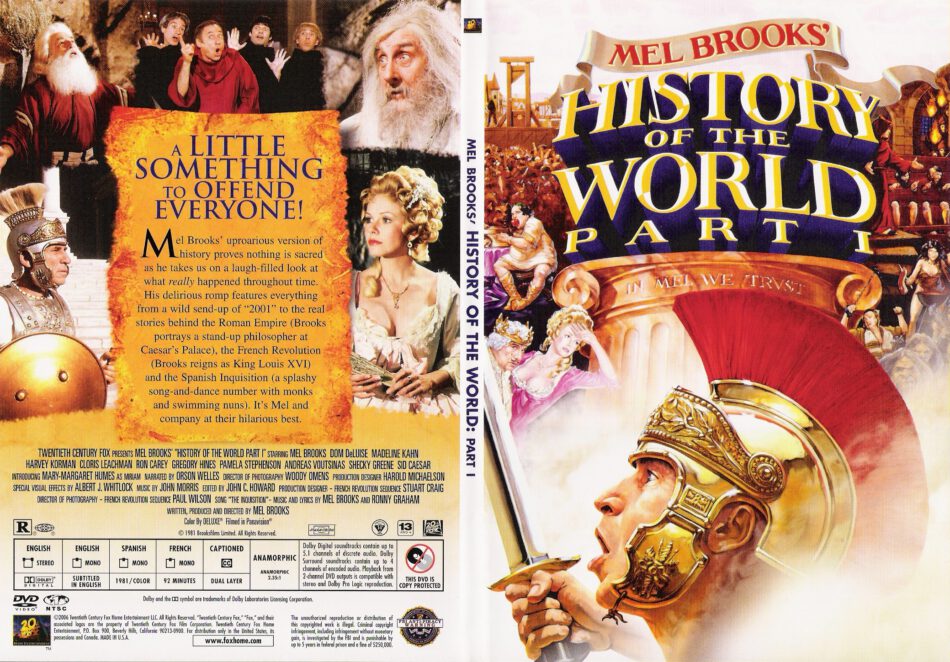History of the World, Part I is a 1981 film that provides a history of mankind covering events from the Old Testament to the French Revolution in a series of episodic comedy vignettes. Mel Brooks brings comic lunacy to the history of mankind covering events from the Old Testament to the French Revolution in a series of episodic comedy vignettes. Mel Brooks brings his one-of-a-kind comic touch to the history of mankind covering events from the Old Testament to the French Revolution in a series of episodic comedy vignettes. It is a story of heroism and sacrifice that would ultimately claim 15 million lives and profoundly change the world forever. There are loads of familiarly funny gags in the film, which opens today at the Sutton, the Criterion Center and the 34th Street East and other theaters. But the movie is so sour that its humor is often undermined, because so many of the jokes are either mean-spirited or scatological, or both.
Women are either explicitly predatory or stupidly decorative, and homosexuals are made fun of regularly. Flamboyantly bad taste, which Mr. Brooks raised to the level of supreme wit in his ''Springtime for Hitler'' number in ''The Producers,'' is this time just bad. A musical number about the Spanish Inquisition, with Mr. Brooks playing a torturer who merrily abuses Jews, is about as crashingly unfunny as a musical number can be.
In 1982, Brooks produced this wonderful valentine to television's golden age. The story centers around a live TV show starring Stan Kaiser and one of his writers, Benjy Stone who's tasked to watch over unpredictable thespian Alan Swann . The film would've been a fine comedy if the characters were invented out of whole cloth, but knowing the real-life counterparts enriches the experience tenfold. And don't miss the classic scene when a gangster confronts Kaiser, who responds to death threats with open mockery. That mixture of wit and physical comedy is what keeps My Favorite Year's 100% "fresh" rating on Rotten Tomatoes. In general, Brooks' films aren't exactly noted for their political correctness—after all, the director's very first film was about an Adolf Hitler musical.
Still, even he wondered if the breakout song in History of the World had finally crossed a line. "I don't know how audiences are going to react to the Spanish Inquisition sequence," Brooks told Mademoiselle. As he put it, trying to get a laugh out of any scene that involved "Jews on racks" could be "very dangerous." In the end, history repeated itself. After The Producers was released, Jewish leaders contacted Brooks en masse with complaints about the film's brazen Nazi gags. Thanks to that big inquisition number, History of the World, Part 1 garnered a similar reaction. Part of the problem with ''History of the World - Part I'' is that it's tired, so tired that the cheerful outrageousness of Mr. Brooks's earlier films has become waxen.
The jokes often recall ''The Producers'' and particularly ''Blazing Saddles,'' but never are they as bold as they were the first time around. The enormous cast includes some of Mr. Brooks's most resourceful comic sidekicks, among them Madeline Kahn, Cloris Leachman and the indefatigable Harvey Korman. Because Miss Kahn is playing her umpteenth sexually voracious female, and Miss Leachman is cast as a hideous hag, and Mr. Korman's sequence includes an endless gag about urination, none of the players are exactly able to triumph over the material. The film is the historical spectacular film genre anthology, focuses on Mel Brooks, wwho brings his one-of-a-kind comic touch to the history of mankind covering events.
Perhaps the most important comedy element of "History of the World" is that it doesn't have a linear story. It is a series of sketches covering the Stone Age, the Old Testament, the Roman Empire, the Spanish Inquisition and the French Revolution, closing with a mock teaser trailer for the nonexistent sequel. Consequently, like the similarly intellectual sketch comedy film "Monty Python's The Meaning of Life" , "History of the World" is freed from all narrative constraints and able to tackle its subject on a more ambitious conceptual level. While "The Meaning of Life" is about philosophy, however, "History of the World" is about history. Brooks casts his comedic eye at humanity's past and, if the sketches are any evidence, seems to view our story as one of big guys keeping little guys down. It's a wild romp through early history, with a few side steps into vaudeville and Broadway.
There are enough funny lines to quote out of this film to keep the average frat house laughing through three or four kegs of Bud. Recognizing its potential to inspire all Americans, Hayes built a national staff of 85 to promote events across the land and the effort soon broadened to include a wide range of organizations, faith groups, and others. They changed the name to Earth Day, which immediately sparked national media attention, and caught on across the country. Thousands of colleges and universities organized protests against the deterioration of the environment and there were massive coast-to-coast rallies in cities, towns, and communities.
Many people are surprised to learn about Mel's serious contributions to cinema. His company, Brooksfilms, produced classics such as 1986's The Fly and 1980's The Elephant Man. Mel Brooks' legendary filmography includes not only the funniest films ever made, but a few surprising landmarks in cinema history. The staff of THIRTEEN picks the thirteen best movies directed or produced by Mel. According to Mel Brooks, the Moses scene was a last minute addition.
"Sometimes, you will get very lucky, and the set will give you ideas for jokes", Brooks said in a 2012 interview with the Directors Guild of America. One day, he was gazing out at the scenery that had been built for the caveman segments, when the gears in his head started turning. "I immediately thought, 'Well, where do I go from here?'" Brooks recalled. Heading into the shoot, his plan was to "skip the Bible and go to Rome." But eventually, he realized that the Stone Age set might enable him to explore another chapter in world history. With a few minor alterations, Brooks converted his fake caves into a mountaintop, and the Moses bit was born. First off, I've always been very appreciative of the hilarious genius of Mel Brooks, and this movie is no disappointment.
Now, I didn't really know anything about it other than everyone has told me it is funny. So we watched it in my Honors-3 class this morning and there was some amazing genius in it. I especially love how Brooks, in all his movies, plays several different roles.
I figure, if you want it done right, sometimes you just have to do it yourself. I don't know how a member of my Big Three comedies could possibly be underrated, but apparently that's where we are now at this point in history. The people who don't like The History of the World are somehow shouting down the millions of people who love it. Today, Earth Day is widely recognized as the largest secular observance in the world, marked by more than a billion people every year as a day of action to change human behavior and create global, national and local policy changes. At first, films were very short, sometimes only a few minutes or less. They were shown at fairgrounds, music halls, or anywhere a screen could be set up and a room darkened.
Subjects included local scenes and activities, views of foreign lands, short comedies and newsworthy events. MEL BROOKS'S ''History of the World - Part I'' shows its stripes right from the opening scene. In this Dawn of Man episode, apelike creatures rise up from the mud, learning to stand erect and reaching nobly toward the heavens. Then they begin bumping, grinding, rutting, gyrating and otherwise slipping back to the slime from whence they came.
Even by prehistoric standards, Mr. Brooks's latest comedy is especially crude. "Sometimes, you will get very lucky and the set will give you ideas for jokes," Brooks said in a 2012 interview with the Directors Guild of America. One day, he was gazing out at the scenery that had been built for the caveman segments in History of the World when the gears in his head started turning. Heading into the shoot, his plan was to "skip the Bible and go to Rome.'" But eventually, he realized that the Stone Age set might enable him to explore another chapter in world history. With a few minor alterations, Brooks converted his faux caves into a mountaintop, and the Moses bit was born. Twenty-two years after Your Show of Shows ended its run, Brooks expressed his gratitude to Caesar by giving him a major role in 1976's Silent Movie.
Brooks would cast the comic again in History of the World, this time as Chief Caveman, who has a zeal for music . On June 12, 1981—35 years ago today—Mel Brooks's irreverent take on the course of human events opened in theaters. Though critics were thoroughly divided, History of the World, Part 1 grossed a respectable $31.6 million at the box office, and left countless viewers hungry for a sequel. These 11 footnotes should get you ready for a 35th anniversary screening.
The same thing goes wrong with Brooks's big production number in this movie, "The Inquisition," featuring a song-and-dance team of medieval monks, and a chorus line of nuns who splash in a pool, Busby Berkeley-style. We're supposed to laugh at the shocking juxtaposition of religious images and Hollywood corn. But Brooks never gives us an additional comic level, one where he's making funny points about the images.
When he dresses up like a monk and then dances like Donald O'Connor, that's only funny for a second. If we knew anything about the monk as a comic character, the scene could build. There also is nothing inherently funny about Jews, Catholics, nuns, blacks, and gays. They can all conceivably provide the makings of comedy, of course, but in "History of the World" Brooks doesn't have the patience to introduce a character and then create a comic situation about him. He introduces the character and expects us to laugh at the character himself.
Instead of developing a comic situation around Orthodox Jews, he simply shows us some, complete with beards and hats, their heads stuck through a stockade, and expects us to laugh. But while we might laugh with Brooks at a comic situation, we have no reason to laugh at people just because of their appearance or religion. Brooks seems to rely on his own spontaneous comic genius in this film, and genius, even when you have it, is not something to be relied upon. He provides isolated moments that are indeed hilarious, moments that find an inspired image and zing us with it . But as the movie creeps on, we realize that the inspirations are going to be rare, and that Brooks has not bothered to create a framework for the movie or to people it with characters. Mel Brooks's movie "History of the World, Part 1" is a rambling, undisciplined, sometimes embarrassing failure from one of the most gifted comic filmmakers around.
Brooks never seems to have a clear idea of the rationale of his movie, so there's no confident narrative impetus to carry it along. His "history" framework doesn't have an approach or point of view; it's basically just a laundry-line for whatever gags he can hang on it. Those are among mine as well, since they contain some of Brooks' most cheerfully vulgar gags. Brooks has never been one to shy away from vulgarity — once famously bragging that his films rise "below vulgarity" — and this perhaps partially explains "Part One"'slukewarm critical reception at the time it was released.
First, even when it isn't making a larger point, it is often quite funny. Brooks' big song-and-dance number about the Spanish Inquisition, for instance, holds up as hysterically tasteless in the tradition of Brooks' "Springtime for Hitler" in "The Producers" even if it doesn't have much depth. Take the wordplay that uses a 12-letter epithet to reference Oedipus, a character from Greek mythology; if you know the classics, you'll get the joke. The film opened in 484 theatres the same weekend as Raiders of the Lost Ark and Clash of the Titans and finished fourth for the weekend with a gross of $4.8 million, behind Raiders, Clash and Cheech and Chong's Nice Dreams. With a per-screen average of $10,000, it was Brooks' highest opening on a per-screen basis.
Despite the strong start, poor word of mouth impacted its box office. Although it grossed $31.7 million, it was considered a commercial disappointment because the film had been "tracking" well and Brooks' previous films had been so successful. Brooks plays Comicus, a "stand-up philosopher," whose job combines elements of philosophy and stand-up comedy. Comicus is notified by his agent Swiftus that he has landed a gig at Caesar's palace. En route to the palace Comicus meets and falls in love with a Vestal Virgin named Miriam (Mary-Margaret Humes) and befriends an Ethiopian slave named Josephus . Josephus' life is spared when he is conscripted into the service of the Empress Nympho .
There is no on-going subscription to be paid, or varying levels service. Simply pay for what you want to watch and you can watch it straight away. This is great for the odd show or movie that your other streaming subscriptions do not have. Reelgood is the most extensive streaming guide in the US and UK, with every TV show and movie available online. Browse through every TV series and movie and sort by title, release year, genre, IMDB rating, and, most important— see where to watch it. Perhaps part of the reason the humor seems worn out or repetitive is because the movie was such an icon at the time that many people have tried to copy it unsuccessfully.
Marred only by overlength, this is one hilarious bit of cinema as Mel Brooks satirizes the stone age, the 10 Commandments, Rome, the Last Supper, the Inquisition, and Louie the 16th (sorry I couldn't get the name right). Of course, the stone age also happens to make fun of "2001 A Space Odyssey". I was so infuriated by the lack of respect that The History of the World holds in the movie world that I immediately sat down and I wrote this entry. Because you better believe this movie belongs on a list like this now. This was one of those movies that, 20 years ago, I required every one of my friends to know on at least a semi quotable basis.
I had no idea that The History of the World was considered a huge flop. I had no idea that most people consider it "the first bad Mel Brooks movie." I had no idea that 90% of movie fans in the world consider The History of the World to be "in the lower tier of Mel Brooks comedies." I can't really tell you what the History of the World is about, because it really isn't about anything.
Unlike most Mel Brooks movies, it doesn't have much of a plot or much of a story structure. All it is is a bunch of random comedy sketches about historical figures. I guess the best way to describe it would be a really good R rated episode of Saturday Night Live. In fact, one of the very first friends I ever had in college , well that only came about because he had a Mac that had over 200 History of the World .wav sound files.
When I found out he had a computer that could just randomly spit out History of the World quotes at you, well I thought I had died and gone to heaven. In 1992, I had no idea that the world contained that kind of technology. When I was in college, there were three movies that I required every single one of my friends to know. I called these the "Mario's Big Three." If you wanted to be friends with me, if you wanted to hang out with me in the dorm, at the very least I required you to have working knowledge of my three favorite comedy movies. And if you could quote them too, well hey that was obviously a big plus. Senator Gaylord Nelson, the junior senator from Wisconsin, had long been concerned about the deteriorating environment in the United States.
Then in January 1969, he and many others witnessed the ravages of a massive oil spill in Santa Barbara, California. Inspired by the student anti-war movement, Senator Nelson wanted to infuse the energy of student anti-war protests with an emerging public consciousness about air and water pollution. Senator Nelson announced the idea for a teach-in on college campuses to the national media, and persuaded Pete McCloskey, a conservation-minded Republican Congressman, to serve as his co-chair. They recruited Denis Hayes, a young activist, to organize the campus teach-ins and they choose April 22, a weekday falling between Spring Break and Final Exams, to maximize the greatest student participation. Interestingly, "Blazing Saddles" also had an instance of the use of faggot.
This time, DeLuise is a director telling dancers in a scene how to do a routine by proclaiming "Watch me, faggots." The film sort of gets away with this use because at least it is clearly a gay man using it with other gay men. Although America still appears to be the most influential film industry, the reality is more complex. Many films are produced internationally—either made in various countries or financed by multinational companies that have interests across a range of media. Today, most people see films on television, whether terrestrial, satellite or subscription video on demand services.
Streaming film content on computers, tablets and mobile phones is becoming more common as it proves to be more convenient for modern audiences and lifestyles. As more people paid to see movies, the industry which grew around them was prepared to invest more money in their production, distribution and exhibition, so large studios were established and dedicated cinemas built. The First World War greatly affected the film industry in Europe, and the American industry grew in relative importance. Mel Brooks did four episodes of the NBC sitcomMad About You and picked up three Emmy Awards for his trouble. He played Paul Reiser's uncle and was decidedly into his dowager phase, but the comedy chops were more than still there.
None of Brooks' episodes are currently streaming, but season 1 ofMad about You is on Crackle and season 3 is on Amazon Video. The watch system was composed of community volunteers whose primary duty was to warn of impending danger. Boston created a night watch in 1636, New York in 1658 and Philadelphia in 1700. The night watch was not a particularly effective crime control device. While the watch was theoretically voluntary, many "volunteers" were simply attempting to evade military service, were conscript forced into service by their town, or were performing watch duties as a form of punishment.
Philadelphia created the first day watch in 1833 and New York instituted a day watch in 1844 as a supplement to its new municipal police force . One of only 15 people to win the EGOT, legendary funnyman Mel Brooks has excelled on the big screen, the stage and television. Let's take a look back at 12 of his greatest films, ranked worst to best. Mr. Brooks himself is both the movie's steadiest screen presence and its worst behind-the-scenes enemy. There's almost no routine here that couldn't have been made funnier with a few deletions. There are dozens of cameo performances, many of which are hard to spot.


























No comments:
Post a Comment
Note: Only a member of this blog may post a comment.